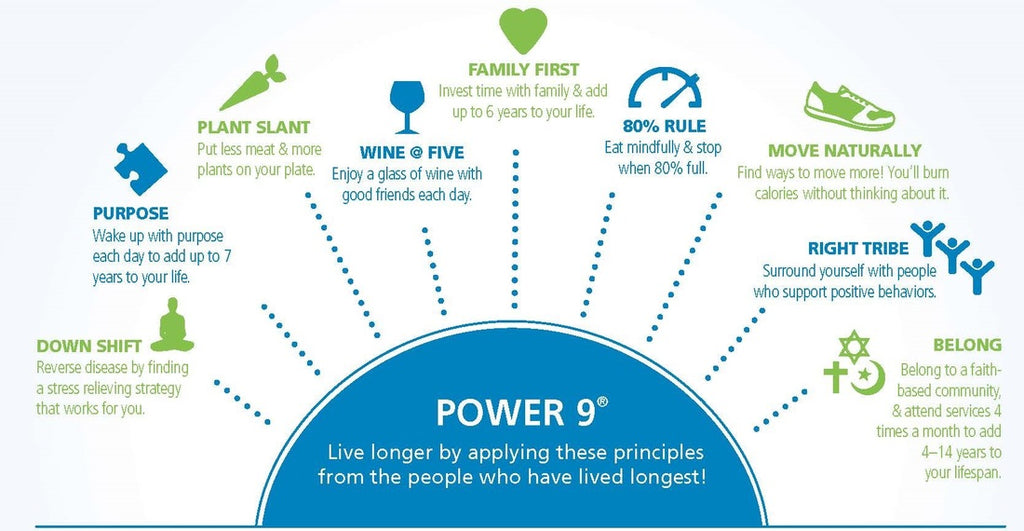Blue Zones are regions of the world which have been identified as having the largest number of centenarians (people living over the age of 100).
Dan Buettener author of the best selling book ‘The Blue Zones’ teamed up with National Geographic to study the behavioural and lifestyle characteristics of the people living in the blue zones. Researchers observed, despite being from different areas of the world and of different races, nationalities and religion, people from the blue zones shared some lifestyle characteristics, like family coherence, avoidance of smoking, plant based diet, moderate and daily physical activity, social engagement, where people of all ages are socially active and integrated into the community.
These characteristics were common across all people enrolled in the surveys.
Where are the blue zones?
The five blue zones where researchers discovered the longest living people on earth include -
- Sardinia, Italy (a small Island off the coast of Italy, specifically an area called the Nuoro Province)
- Ikaria, Greece
- Okinawa, Japan
- Nicoya, Costa Rica
- Loma Linda, California (an area where a religious group called the Seventh-day Adventists live)
Once the areas had been identified, a team of medical researchers, anthropologists, demographers and epidemiologists were then assembled to search for evidence based common denominators among all places.
They found 9:
- move naturally
- find ways to de-stress (such as napping or praying)
- drink a moderate amount of wine daily
- eat a mostly plant based diet
- 80% rule (eat until your 80% full),
- a strong sense of purpose
- putting family first
- have strong friendships
- faith
Move Naturally
These days we’re obsessed with the gym, pumping iron and always trying to physically push ourselves.
However, this study found the longest living people in the world were not bench pressing or running marathons, physical activity is part of their everyday lives. They maintain gardens and crops, and have very few mechanical conveniences instead working with their hands. They all walk daily.
De-stress
A healthy balanced diet and exercise will keep you fit and strong, but ultimately if you are stressed no matter how healthy a lifestyle you lead your body is susceptible to illness.
Stress leads to chronic inflammation and inflammation is associated with every major age related disease.
Relaxation is key, make time for it. The Adventists in California pray, Ikarians take a nap and Sardinians do happy hour.
Drink a moderate amount of wine daily
All the blue zone inhabitants drink wine regularly and moderately, 1-2 glasses per day with friends or with food (except the Adventists). Don’t take this as a signal to drink daily! We must understand the wine they are drinking has been produced locally either by themselves or in the village. It is likely to be very fresh, organic, minimally processed and without sulphites. Wine is made from fermented grapes.
Fermented foods have become more popular in recent years as part of a balanced diet they help promote a healthy gut, however the wine we consume is likely to have been pasteurised or heat treated and cannot be compared to the wine consumed by the blue zone inhabitants.
Plant based diet
With meat eaten only on average 5 times per month, foods that are especially prominent in the blue zones diet include vegetables, fruits, herbs, nuts and seeds, beans and legumes, quality fats like olive oil, high quality dairy products like grass fed goats milk and homemade cheeses, fermented products like yoghurt, kefir, tempeh and miso, and whole grains such as durum wheat or locally grown organic corn.
These foods lower inflammation, deliver loads of fiber, antioxidants, potential anti-cancer agents, cholesterol reducers and blood clot blockers, plus essential minerals.
This is likely to contribute to the fact people in the blue zones suffer less from heart attacks, strokes, diabetes, dementia and cancer.
The animal products consumed are far more nutritious in comparison to what we consume as they are always raised locally, grass fed, pasture raised, wild caught and never pumped full of antibiotics or growth hormones.
80% rule
The Okinawans follow a rule where they stop eating when their stomachs feel 80% full.
The blue zone study showed inhabitants eat the smallest meal of the day late afternoon or early evening and nothing more after this, reminiscent of the old saying ‘Eat breakfast like a king, lunch like a prince and dinner like a pauper’.
Purpose
Why do you wake up in the morning? Having a sense of purpose was found to add years to life expectancy of inhabitants of the blue zones.
A combination of good habits is the key to living a longer, healthier and happier life.
What can you take away from the blue zones study and their routines, diets, viewpoints on exercise and beliefs? How does your lifestyle compare to those living in the blue zones?


Leave a comment